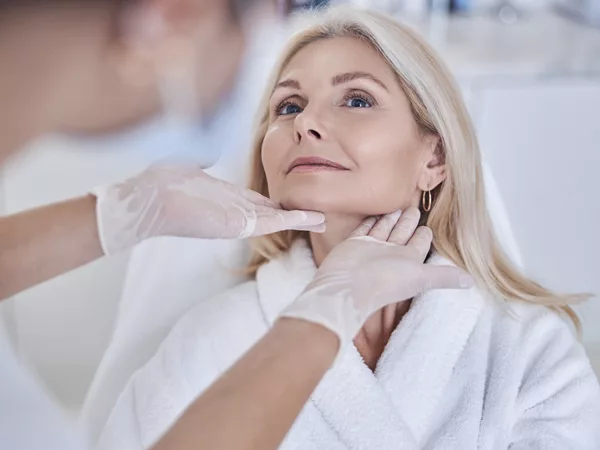Vitamin C and Retinoids for Anti-Aging

It’s easy to fall prey to the many promises of youthful, flawless skin. Despite the abundance of products and procedures available, only a few with scientific evidence behind them are available.
When addressing the signs of sun damage and aging skin, the two most common dermatologist-recommended anti-aging ingredients are vitamin C and retinoids.
Let’s talk about these important products for your skincare routine.
VITAMIN C
Topical vitamin C is supported by multiple clinical studies and shown to be effective in helping slow early skin aging, prevent sun damage, and improve the appearance of wrinkles and dark spots. Vitamin C is an antioxidant that fights harmful free radicals that come in contact with your skin from external sources, like air pollution. It also helps protect the skin from harmful ultraviolet rays when combined with a broad-spectrum sunscreen. Vitamin C is in serums or other skincare products.
L-ascorbic acid, also called ascorbic acid, is a form of vitamin C our bodies use. But it is not a stable compound when applied topically. When exposed to light, air, or heat, it degrades quickly in bottles and tubes. If you buy a serum with a high concentration of vitamin C (I recommend 20% or less), it’s in fact much lower in concentration by the time you apply to your skin and even less once the bottle has been open for a few weeks.
THD ascorbate is lipid-soluble and much more stable than L-ascorbic acid. Its lipid formulation helps penetrate the deeper layers of the skin, and it’s gentler than ascorbic acid. Once you apply THD ascorbate topically, the body breaks it down into ascorbic acid and then uses it for all the good things vitamin C can do for your skin.
RETINOIDS
Topical vitamin A, also referred to as retinoids, is the most used and studied anti-aging compound. Retinoids reduce fine lines and wrinkles by increasing the production of collagen.
Under the name Retin-A, Tretinoin was the first retinoid used as an acne treatment in the 1970s. Over time, it proved to fade age spots, even pigmentation, and accelerate the turnover of superficial skin cells.
But topical retinoids formulated to treat acne can be too drying and irritating to be used in your daily anti-aging skincare routine. Since retinoids must be used continually to maintain their benefit, cosmeceutical options can offer you the same great anti-aging benefits without those adverse side effects.
Be sure to wear a daily sunscreen, as retinoids increase the skin’s sensitivity to sun exposure. Several over-the-counter products containing retinoids, such as Retinol, are available. They’re less irritating because they are not as strong, and therefore not as effective, in reducing wrinkles. But they can still improve the appearance of sun-damaged skin.
Our skin changes as we age, so it’s essential to re-evaluate the condition of your skin and any concerns regularly. I recommend consulting with a licensed skincare specialist who can evaluate your skin and customize a skin care protocol just for you. Your dermatologist is a great place to start when seeking help and advice.
Speak with a skincare specialist who can answer your questions, evaluate your concerns, educate you on what’s available, and make recommendations on medical-grade skincare products, cosmetic procedures, and laser treatments best for you.
Always consider purchasing medical-grade (also called cosmeceutical formulated) vitamin C and retinoid products from your dermatologist’s office rather than miracle solutions on social media.
https://store.mcguinessdermatology.com/





